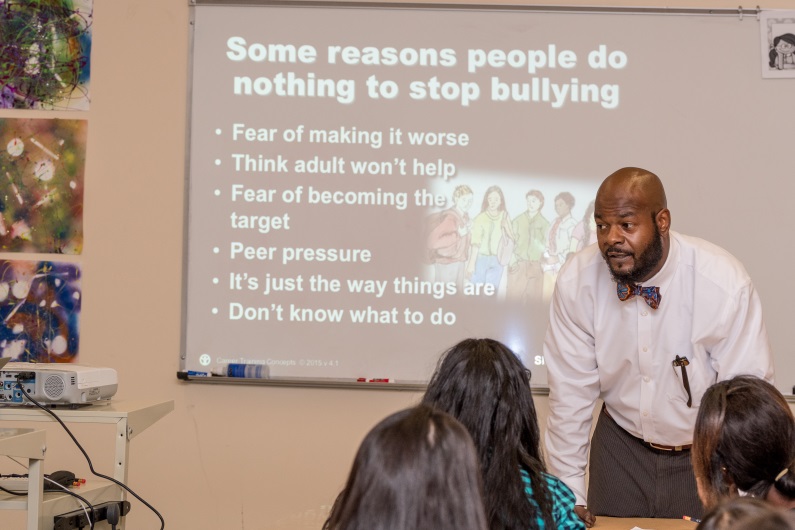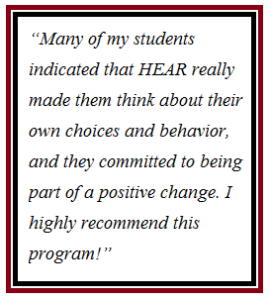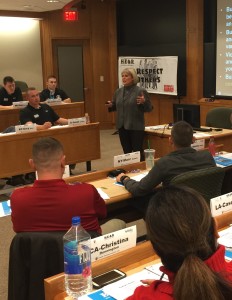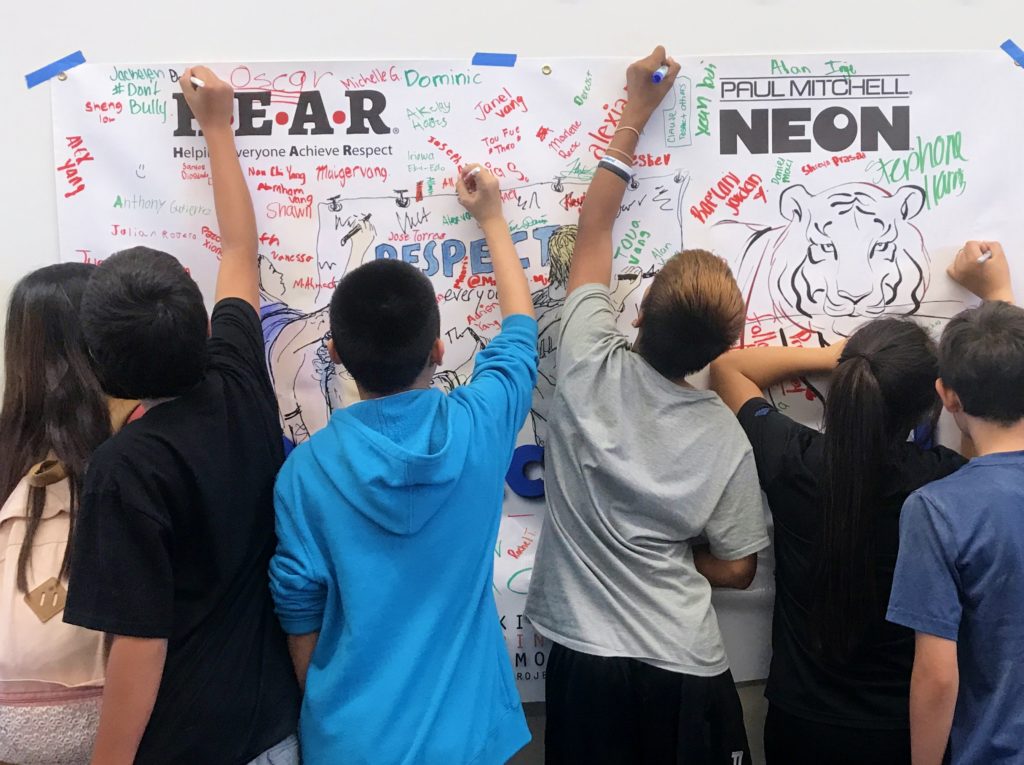We hope that all of you who work in education found time to rest, recharge and have fun this summer in between all the school-related activities — professional development events, writing lesson plans, collecting supplies for your students, reading education-related material, and searching online for new ideas. Summer flies by so quickly, doesn’t it? Welcome back!
Unfortunately, no matter how prepared you are to teach, positive outcomes are limited if students feel unsafe, excluded, and disrespected. Schools need affordable, research-based, proven resources that can help eliminate distractions from learning by building more respect in the school community. Not to mention, our world needs inspiration and education that fosters kindness, understanding, empathy, appreciation of diversity, and civil, productive conversations and behavior.

HEAR instructor, Kayin Jones, engages middle school students in a discussion about bullying prevention and respect building.
HEAR – Helping Everyone Achieve Respect — is one such resource. It is a 60 minute interactive, student workshop created in collaboration with subject matter experts from the Harvard Graduate School of Education’s initiative, Making Caring Common, and the University of Nebraska Lincoln. There are two versions. One was specifically designed for middle school students, and the other is for high school students. HEAR complements most schools’ policies, standards, mission, behavior plan, and efforts to improve social emotional learning and overall school climate. It is a practical, classroom tool with structured discussion around real-life case studies that stimulate thinking, reading, writing, and discussion about why positive character traits are essential, about the many forms and consequences of bullying/cyberbullying, the importance of putting safety first, and strategies for making the school a better place by appropriately responding to and preventing bullying. HEAR also encourages personal responsibility and helps students recognize that each one of us really can make a difference.
One school counselor in Iowa described HEAR this way: “Many of my students indicated that HEAR really made them think about their own choices and behavior, and they committed to being part of a positive change. I highly recommend this program!”
choices and behavior, and they committed to being part of a positive change. I highly recommend this program!”
To learn more about HEAR content, deliverables (including a student survey that provides useful data to educators), and instructional resources, please visit www.project-hear.us. The paragraphs that follow explain how to obtain HEAR for your school.
The first step is to contact us so we can answer your questions, discuss your needs, and work to schedule a presentation(s).

On the campus of the Harvard Graduate School of Education, Dr. Sue Swearer shares the latest bullying research with members of the Army National Guard.
You may be wondering about costs. HEAR is offered at no cost to high schools, thanks to the Army National Guard, who purchases materials and ensures that key members are trained to facilitate HEAR as guest instructors in communities across the nation. In fact, we’ve distributed high school material for over 800,000 students in 51 states and territories since the roll-out of HEAR in 2013.
There is a cost for HEAR for Middle Schools. Some schools are fortunate to have existing funds from government or grant sources, local sponsoring businesses, or the PTA/PTO, to name a few. Other schools lack financial resources, and we want to help. We have found that federal dollars may be available for professional development and parent education, so we offer these options for our middle schools. The parent/guardian presentation teaches HEAR content so adults will know how to support their children around bullying, what to look for if their child is being bullied, and how to effectively collaborate with the school to create a kinder environment.
While we are always happy to facilitate HEAR with your students, we also offer professional development so that you are prepared to effectively teach HEAR. The training may involve an opportunity to observe a student workshop followed by discussion focused on content, teaching tips and strategies, and information found in each trainee’s resource-packed instructor kit. We can also provide training by way of video conference. In any event, teacher training focuses not only on how to teach HEAR but also how to sustain the benefits of HEAR.
Another way to minimize costs is to select local high school students to serve as mentors and teach HEAR to middle school students. The training for student-instructors is much like the teacher training described above. Learn more about the effectiveness and benefits of this model on our blog.
In addition, suggestions for funding sources, such as grants, are available on our website. A few grant sources are outlined below. Please check the organizations’ websites for additional information.
Safe Fleet’s United Against Bullying Grant Program
The United Against Bullying Grant is awarded to numerous organizations that demonstrate outstanding efforts to prevent bullying in their communities. The award can be used for various initiatives, including implementation of projects or training. Last year’s deadline to submit an application was late March.
This philanthropic arm of Sprint supports hundreds of organizations every year in missions to positively impact communities. One priority is character education. Applications can be submitted online January through November.
The NIJ funds projects through its Comprehensive School Safety Initiative to improve safety for K-12 students nationwide. Since 2014, it has awarded more than $65 million annually to projects that aim to, among other things, “…implement programs, policies, and practices that improve school safety and climate, focus on the school environment, or enhance educational and other outcomes for students and schools.”
This foundation gives to non-profit organizations that contribute to child advocacy and education. They are particularly interested in promoting diversity, inclusion and activities that help end discrimination. Applications are accepted on an ongoing basis, and awards range from $1,000 to $1 million.

Students sign the “I Respect Others” commitment banner.
In conclusion, we also invite you to visit www.projecthearus.org to learn about our non-profit foundation dedicated to assisting you in finding financial support for HEAR for Middle Schools. Based on educators’ feedback and survey data, we know that a proactive partnership between your school and HEAR will build respect, and you know that respect will impact students’ social emotional development and academic achievement in the new school year. Let’s get to it!
